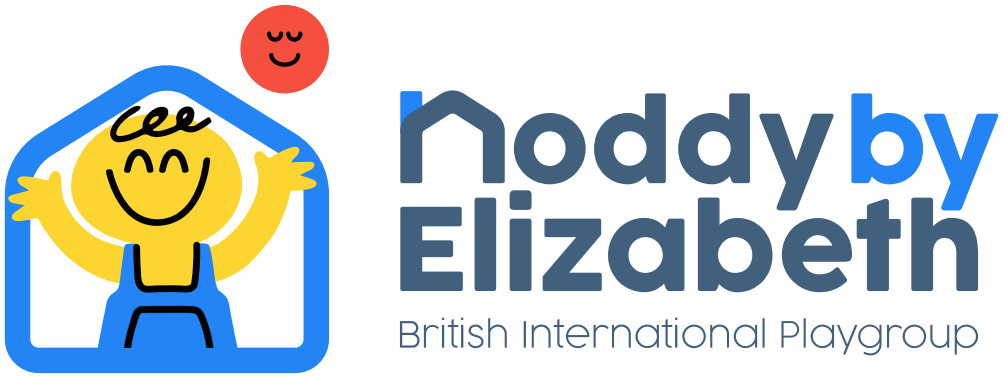
Pre-school education is every bit as important as a formal education is for older students. Learn about the early years pre-school education your child will receive at Noddy by Elizabeth, a British international pre-school in the Sathorn area of Bangkok.
NODDY was established in 1978 and teaches the British Early Years Foundation Stage (EYFS) educational curriculum. Simply put:- the curriculum is designed to prepare children for their future. It emphasises child development in several areas, including basic hygiene, physical fitness, social awareness, fine motor skills, general knowledge of the world around us, and creativity.
The curriculum also encourages children to explore their communication abilities by developing their language skills and beginning to read and write. They also learn basic social manners and the proper and kind way to behave around others.
The curriculum follows the ‘Five Areas of Learning’. These areas were first introduced by Dr. Maria Montessori in the early 1900s. They remain just as relevant today in providing a complete developmental education to a young child before they enter their formal education. The five areas of learning, which all develop gradually as the child grows, are:
- Practical life – This encompasses developing social skills, independence, and caring about the world around them and the natural environment.
- Sensorial – Topics covered include colours, textures, shapes, dimensions, and weights. It teaches children how to distinguish between different tastes, smells, and sounds and the names of all these different things.
- Language – Includes oral language and reading, writing, and basic literary skills. It also includes phonics, letter formation, vowels and consonants, and sentence structure.
- Mathematics – Includes learning numbers and quantities, as well as counting, addition, subtraction, multiplication, division, and the decimal system.
- Culture – This includes botany, zoology, geography, the sciences, history, art, and music.
In teaching these five areas of learning, children should be given the freedom to learn and develop at their own pace with careful monitoring and encouragement from teachers. NODDY by Elizabeth has adopted the principles of both the “Free-Flow-Play” theory which was first introduced by Professor Tina Bruce, and the “Learn Through Play” technique. Both of these concepts have long been basic premises of early years developmental education and complement each other whilst stressing that children should be given the freedom to guide their own direction of play.

Free-Flow-Play
Professor Tina Bruce is an educationalist and an honorary visiting professor of Early Childhood Studies at Roehampton University in London. Professor Bruce has defined Free-Flow-Play as:
- Play is a process without a goal. The reward comes from simply taking part in the activity.
- Play is motivated by pleasure. Pure play doesn’t have any external rewards. The child takes part in it simply because it’s fun to do so. This is also seen as self-motivational, as the child is in control of their own play.
- Play is done without any external pressures. There are no rules, tasks, directions, or goals to conform to. The child is free to explore and experiment in any direction they choose without feeling any pressure to perform.
- Play supports creativity. It’s a time and place to make up alternate worlds and create original and innovative concepts. This benefits a child’s social, emotional, and cognitive development.
- Play means taking risks and experimenting. It’s about exploring new feelings, ideas, and relationships with our peers. It’s also about looking inwards to see how we feel about this exploration and learning about the meaning of “consequences”.
- Play uses first-hand experiences as subjects. It allows the child to re-explore these experiences and create new meanings for them. It allows them to be in the moment and make sense of the experience and the environment around them at the time.
- Play is best when it’s sustained. When play is at “full flow,” the child learns to function and think in advance. This introduces the concept of “cause and effect” and helps them react more intelligently to situations in their own lives.
- When children play, they naturally work on their problem-solving abilities. They learn to use all the skills they’ve developed as tools to solve specific problems they encounter while playing. This increases their self-confidence, helps them control their emotions, and encourages them to take control of their lives.
- Playing with a playmate teaches compassion. Children learn that for play to be mutually enjoyable, both parties must treat each other with kindness and respect. Without this common bond, playing won’t have any pleasure.
- Children learn that you don’t always have to have someone to play with. Solitary play can be fun. Solitary play also allows the child to develop a sense of self and should be encouraged at times. Solitary play allows the child to practice skills they’ve learned without any pressure from peers or adults.
- Parallel play is a phenomenon noticed among toddlers and young children when they play next to each other, but not together. Children have a sense of others around them and may gain support from this closeness without needing to interact with others.
- Professor Bruce finished the list by pointing out that play integrates everything a child has learned, knows, can relate to, and understands. Play is to be encouraged and treated as one of the most important aspects of a developmental education. It can engage every aspect of a child’s physical and intellectual being and it encourages the development of ideas.
Visit Noddy by Elizabeth
Call us to arrange a visit to Noddy by Elizabeth’s British International School. You’ll be able to learn more about the importance of play in education. We can show you the grounds and facilities at our school and discuss any questions you may have about our curriculum. You’ll also be able to meet some of the teachers and administrators that provide a caring and nurturing educational environment for your children at Noddy by Elizabeth.
